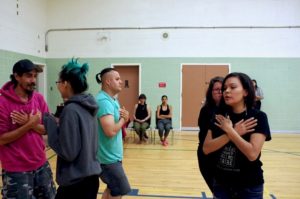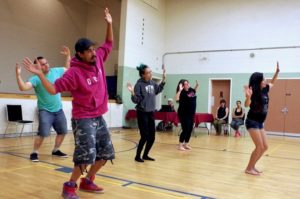Restorative justice themed project engages youth

By Rick Garrick
THUNDER BAY—The Centre for Indigenous Theatre hosted the first of two Giving Justice a Voice with Alanis King introductory theatre workshops on July 16-20 in Thunder Bay.
“All together we had seven participants here in Thunder Bay,” says Alanis King, an Odawa playwright and director from Wiikwemkoong who was the first Aboriginal woman to graduate from the National Theatre School of Canada. “Today [we are] culminating with a brief performance on Giving Justice a Voice.”
King says the project was funded through a one-time arts grant from the Attorney General. The project focused on the theme of restorative justice as a way to engage youth on opportunities and traditional teachings.
“So this project involved Elders teachings, sitting with them in ceremony, and also land-based teachings,” King says. “When you are in an urban centre, you forget that part of your culture really is that stewardship of the land and that kinship to the land, so it’s kind of a reminder of that, but also the real hard truths about the over-the-top incarceration rate of Aboriginal people.”
Robert Mamakeesic, a workshop participant from Sandy Lake, enjoyed learning about theatre and justice for Indigenous youth during the workshop in Thunder Bay.
“Alanis is awesome, she is really talented and she makes everything fun for everybody so everybody gets involved,” Mamakeesic says. “We were mainly interested in the Aboriginal justice for the youth. We are not really theatre actors, but it was really fun.”
King worked with five second-year theatre students to deliver the workshop in Thunder Bay, which was held at the Avila Centre at Lakehead University.
“They are already gifted in the acting field, so they are very quick to help the youth who have never been on the stage before,” King says. “I try to bring out the voice of the youth in any manner that is possible. You can’t really train voice in a week, so we are doing that by using microphones.”

King says the five theatre students will be able to use the skills they learned during the workshops to teach other people, possibly in their own communities.
“They could do themes of justice there and approach it in a whole completely different way than the way I led it,” King says. “Theatre is so open that way, so versatile.”
Casha Adams, a filmmaker from Couchiching, captured photographs and videos of the participants during the workshop in Thunder Bay.
“I’ve just been getting asked to do a couple of shoots here and there, so that is how I got involved,” Adams says. “I’ve been following them around on their daily activities. Now I’m just going to film their presentations today.”
The second workshop is scheduled for July 23-27 in Aundeck Omni Kaning. King says about five or six youth have already signed up for the workshop in Aundeck Omni Kaning.
“There are four of them for sure from Wiikwemkoong,” King says. “There is one from M’Chigeeng and there might be one from [Aundeck Omni Kaning].”
The Thunder Bay workshop also included field trips to a variety of locations in the area, including Definitely Superior Art Gallery, Thunder Bay Art Gallery, Mt. McKay and Ouimet Canyon.
“I just feel so honoured to be invited up to this territory,” says Eve Saint, one of the theatre students from Toronto whose family is from Attawapiskat. “Going up to Mt. McKay and to (Ouimet) Canyon was so beautiful because being an urban Indigenous person from Toronto, we don’t get this landscape, we don’t get this connection with the land.”

